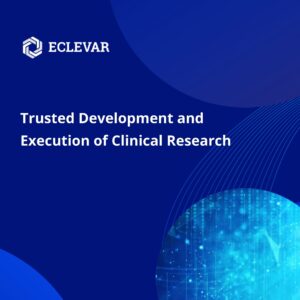Clinical Research: Development and Execution
To perform a Clinical Research is critical for the evaluation of medical devices in terms of safety and performance. The trials involve the participation of human subjects and are conducted to assess the effectiveness and potential risks associated with the device to support the approval and market entry of innovative treatments.
Clinical trials are not limited to a specific phase of a medical device’s life cycle. They can be conducted both during the premarket phase, as well as during the postmarket phase.
Navigating the clinical trial process can be complex, particularly considering the variations in regulatory affairs between different countries. Manufacturers often find it beneficial to partner with professionals who possess the necessary knowledge and expertise in this field. Contract Research Organizations can be an excellent choice for companies seeking support in conducting a Clinical Research.
The Conduct of a Clinical Research
Determining whether a medical device requires a clinical trial is an important initial step in of the design process. Manufacturers should consult with regulatory authorities and seek expert advice to ensure compliance with the specific requirements of the jurisdiction in which they wish to market their device.
Once the decision to conduct a clinical trial is made, the study development begins. The research team must consider variables and factors that will shape the entire study process. The specific objectives of the trial will guide the selection of appropriate study endpoints, patient population, and control groups.
A well-designed clinical trial takes into account all variables, allowing the team to generate meaningful data that can either support or refute the desired hypotheses or claims regarding the device’s performance.
Clinical Protocol Development
For the first step, the development of a Clinical Trial Protocol is essential. The protocol acts as a blueprint, specifying all the necessary details that are expected to be included in the trial. By meticulously outlining the procedures and requirements, the protocol establishes a standardized framework that facilitates consistent and reliable execution of the study.
According to the ICH Good Clinical Practice guidelines, the protocol should indicate the following topics:
- Basic information (title page)
- Background Information
- Objectives/Purpose
- Study Design
- Selection and Exclusion of Subjects
- Treatment of Subjects
- Assessment of Efficacy
- Assessment of Safety
- Adverse Events
- Discontinuation of the Study
- Statistics
- Quality Control and Assurance
- Ethics
- Data handling and Recordkeeping
Clinical Trial Monitoring
Clinical Trial Monitoring is a critical component of the Clinical Research process, that ensures the integrity and reliability of the data collected during the trial. Regular monitoring visits to trial sites allow for comprehensive assessments of compliance to the study protocol and standard operating procedures.
By closely monitoring the trial, researchers can mitigate risks, ensure data accuracy, and uphold the highest standards of ethical conduct, ultimately contributing to success of the clinical trial.
Considerations for the design of Clinical Trial Monitoring:
- Complexity of the protocol
- Risk of the treatment
- Disease being evaluated
- Number of study subjects enrolled at the site
- Number of treatment sites
- Site performance
- Sponsor monitoring standard operating protocols
To guarantee expertise in your trial’s monitoring activities, partner up with an experienced organization.
Clinical Data Management
The primary objective of Clinical Data Management (CDM) is to gather concrete data that proves the claims of medical technologies, leading to a favourable determination regarding their safety and effectiveness. Throughout the entire research process, the data management team plays a vital role in ensuring that all data is meticulously collected, validated, complete, and consistent.
With emphasis on efficiency and accuracy, CDM present a comprehensive range of key aspects and activities focused on handling the information resulted from practical studies. The CDM process consists of:
- Data collection
- CRF tracking
- Data Entry and Validation
- Database Designing
- Discrepancy management
- Medical coding
- Database locking
Clinical Site Management
Complying with protocols and establishing the appropriate infrastructure and staffing in line with the trial requirements is crucial. The goal of a Site Management Organization (SMO) team is to make sure the protocols are followed. By doing so, they ensure that the Clinical Research process is conducted effectively and efficiently.
Site Management activities include:
- Selection of appropriate sites for conducting the study
- Obtaining regulatory approvals, training site staff on the protocol and study procedures, setting up equipment, and ensuring that necessary documentation is in place.
- Monitoring the outgoing trial
- Closeout activities
- Documentation preparing
- Managing patient recruitment
- Managing and fulfilling staff requirements and recruitment.
- Identifying and/or managing investigators and sub-investigators.
- Preparing Institutional Review Boards (IRB) submissions.
Good Clinical Practice
These guidelines, formulated by the International Conference on Harmonisation of Technical Requirements for Registration of Pharmaceuticals for Human Use (ICH), provide comprehensive protocols for clinical trials and investigations of medical products. Aimed at both investigators and sponsors, the guidelines direct the entire evaluation process, prioritizing the safety and welfare of trial subjects.
Prior to the initiation of a trial, it is crucial to thoroughly disclose potential risks, inconveniences, and benefits to all participants involved. The understanding of each individual regarding the trial process and its consequences holds great importance, as the safety and well-being of the trial subjects should take precedence over the interests of science and society.
Regulatory Demands
To ensure the success of a study, an expert Contract Research Organization (CRO) works closely with the client to prepare scientific documentation tailored to their specific needs. The CRO also assists in implementing a competitive and cost-effective strategy for the marketing application process.
By aligning with regulatory requirements, the CRO helps navigate the complex landscape of regulatory affairs, ultimately supporting the successful targeted market entry of the product.
Compliance with FDA
the Food and Drug Administration (FDA) holds the responsibility of regulating firms engaged in the manufacturing, repackaging, relabelling, and/or importing of medical devices in the United States. Compliance with FDA regulations is decisive for any medical device to be suitable for the US market.
FDA speculates that medical devices distributed in the U.S. must comply with the following basic regulatory requirements:
- Establishment registration
- Medical Device Listing
- Premarket Notification 510(k) or Premarket Approval (PMA)
- Investigational Device Exemption for clinical studies
- Quality System regulation
- Labelling requirements
- Medical Device Reporting (MDR)
Compliance with MHRA
The Medicines and Healthcare products Regulatory Agency (MHRA) operates as an executive agency under the Department of Health and Social Care in the UK. It is crucial for manufacturers based in the UK who plan to supply medical devices within the country to familiarize themselves with the relevant following regulations:
The Medical Devices Regulations 2002 (SI 2002 No 618, as amended) (UK MDR 2002),
and the General Product Safety Regulations 2005 (SI 2005 No 1803).
Since January 1, 2021, several changes have been implemented through secondary legislation to regulate the placement of medical devices on the market in Great Britain.
Compliance with TGA
Australia’s Therapeutic Goods Administration sets a series of indications for regulatory compliance. Sponsors seeking to register their devices in the ARTG (Australian Register of Therapeutic Goods) may need to provide a set of documents, depending on the specific circumstances. To a valid application, sponsors need to submit documents such as:
- Device specifications
- Quality control information
- Clinical evidence
- Conformity assessment certificates
Eclevar – Clinical Research expertise for your medical device
A highly skilled and efficient team is essential for successful clinical trial strategies. As Contract Research Organization (CRO), Eclevar plays a crucial role in ensuring the success of these processes. We bring together key responsibilities and expertise, including:
- Project and Quality Management
- Research and Clinical Trial Assistance
- Regulatory Affairs Management and Operation
- Data Analysis
- Statistical and Biostatistical Indication
Eclevar Medtech is highlighted as a unique CRO that integrates competent authority, notified body, and expertise to support all clinical evaluation, clinical trial, and regulatory challenges. Our team, composed of Clinical Research experts and led by former notified body, offer comprehensive services from pre-market to post-market follow-up. Contact us for partnering up!

